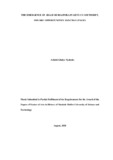THE EMERGENCE OF ABAGUSII DIASPORA IN KENYA’S SOUTH RIFT, 1895-2007: OPPORTUNITIES AND CHALLENGES
Abstract
Migration is a spatial phenomenon involving movement of people between distinct places, locations imbued with meaning and power. It explicitly refers to people changing their places of residence, where they live on a habitual basis, embracing not only their actual physical structures, but also in some sense the wider community in which they live. The study focused on the Abagusii migration patterns from their ancestral land specifically to the South Rift (SR), Kericho County. It acknowledges the fact that their emergence in the diaspora just like any other ethnic group in Kenya, came to existence in the pre-colonial, colonial and post-independence period. The aim of the study was to trace their movement, settlement, challenges, and opportunities they encountered in South Rift between 1895 and 2007. This research addressed four objectives,namely; to examine the emergence of Abagusii before colonialism, to evaluate the migration of the Abagusii into South Rift in colonial era, to assess the migration of Abagusii into South Rift in Post-colonial era, and lastly, to explore the challenges andopportunities they encountered in the South Rift. The study focused on the period from 1895 as it was the genesis of the British colonial policies which witnessed forceful movement of the Abagusii as well as other Kenyan communities. The study stretches up 2007 because it marked one of the darkest periods in Kenya’s history; the post-election violence period, which had widespread killings and destruction of property in many parts of the country. South Rift, specifically Kericho County, was a battle zone between different ethnic groups. Thus, most people were internally displaced due to the crisis that resulted from the violence. The study adopted the Materialist Interpretation of History theory. This theory uses methodological approaches of Marxist historiography that focuses on human societies and their development over time, claiming that they follow a number of observable tendencies. The study adopted qualitative research design where non-probability sampling techniques (such as opportunity sampling, snowball sampling, and, purposive sampling) were used. Data was analyzed through content analysis of documents obtained from the Kenya National Archives (KNA) that were collaborated with information from field observations and interview schedules. The study found out that the main challenges encountered by the Abagusii in the Diaspora were politics of exclusion, community hatred and animosity experienced after the re-introduction of multiparty democracy, incitement from the Kipsigis politicians who advocated for the explosion of the Abagusii from their land among others. The research found out some of the opportunities to include; the provision of social amenities, trade, intermarriage with the Kipsigis, adoption of mixed economy and availability of job opportunities among others. The study recommends that, peaceful initiatives need to be undertaken to realize peaceful co-existence between the Abagusii and the Kipsigis. The study also recommends that Abagusii in the diaspora and the Kipsigis should be educated on the importance of peace and encouraged to interact with each other peacefully. The researcher further recommends that, a study should be carried out on Abagusii who migrated to other parts of the diaspora in order to draw comparisons of the challenges and opportunities they encountered.

